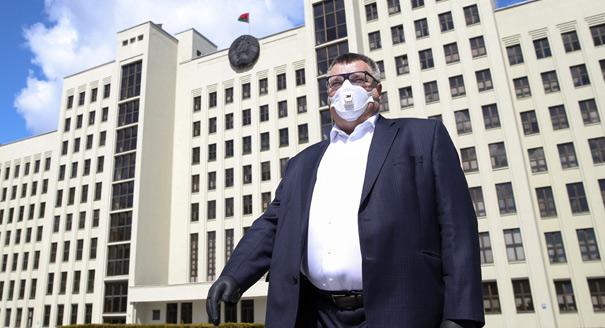The Belarusian presidential election scheduled for August 9 looks set to be less uneventful than the country’s longtime president Alexander Lukashenko had hoped.
Instead of raising pensions and salaries and touring the country’s fields and factories like he usually does, Lukashenko is having to explain over and over again why, while the rest of the world is in various stages of lockdown, Belarus has chosen to tackle the new coronavirus pandemic in its own surprisingly liberal way: with parades, football championships, and open borders.
In addition, for the first time in twenty-five years, the election has coincided with a sharp economic decline. Belarus’s GDP is forecast to fall by 4–5 percent by the year’s end, due not only to the pandemic, but also the recent oil dispute between Belarus and Russia, followed by the slump in global oil prices, which hit Belarusian oil production and exports hard.
These problems have contributed to a revival of protests. The charismatic video blogger Sergei Tikhanovsky is touring the regions, persuading recently apolitical people to take to the streets to call for Lukashenko’s resignation under the gloves-off slogan “Stop the Cockroach.” When Tikhanovsky was barred from running in the election on a formality, his wife registered her candidacy instead.
Even more unusually for Belarusian politics, two other presidential candidates hail not from the opposition, but from the establishment. Valery Tsepkalo is a former ambassador to the United States and deputy head of the Foreign Ministry who later created the Belarus Hi-Tech Park, while Viktor Babariko is a banker and philanthropist. Their ideas are similar: sweeping modernization of the state and liberalization of the economy, a two-term limit for presidents, and a neutral, pragmatic foreign policy.
Babariko in particular is rapidly becoming popular. Polls carried out by popular news sites of tens of thousands of voters show him with more than 50 percent of the vote, while Lukashenko is barely polling 10 percent.
So the blogger Tikhanovsky is converting Lukashenko’s former supporters in the regions, who are disillusioned following a decade of economic stagnation. The urban middle class, meanwhile, which previously saw no viable alternative to the president, has been given new hope by the candidates from the world of business.
It’s likely that the trigger for Tsepkalo and Babariko’s foray into politics was the pandemic, which has shown more clearly than ever that in a critical situation, Lukashenko’s personal views determine everything. He decided there would be no lockdown or restrictions, and neither the advice of the WHO and his own health minister nor the example set by all neighboring countries made any difference. Many Belarusians, including some in the nomenclature, have found this a shocking reminder of the Soviet reaction to the 1986 Chernobyl nuclear disaster.
What’s more, because of Lukashenko’s staffing policy in recent years, it’s fair to say that the views of the Belarusian prime minister, most of the government’s economic bloc, and the heads of the central bank and Foreign Ministry are closer to those of Tsepkalo and Babariko than Lukashenko’s. For the first time in many years, discontentment among the elite appears to have spilled over into the public space, though it would be premature to expect the system to collapse any time soon: the problems are not yet big enough.
Belarus still has about $7 billion in currency reserves, and will likely manage to secure some kind of international financing, meaning a default and economic disaster will not happen this year. In theory, the main political risk to the current Belarusian leadership is a schism within the elite, but so far, no public dissent from incumbent officials has been forthcoming. In any case, it would need a crisis of loyalty among the siloviki to be effective, and there are no signs yet of that among senior law enforcement or the military.
Babariko and Tsepkalo could, of course, simply be removed from the race: irregularities might be found in the lists of signatures they have collected in support of their candidacies, for example. But this would be a risky move.
If the candidates are refused registration to run in the election, then even the illusion of competition disappears. In the history of Belarusian politics, no candidate who had actually collected the required 100,000 signatures has ever been barred from running. Alternatively, it could be announced that the rival candidates had only won a comical percentage of the vote, but it’s unclear how their many supporters might react.
For now, none of these risks appears to be a genuine threat, but it’s clear that this presidential campaign will change Belarusian politics. It might be that Tsepkalo and Babariko are looking to the long term, with the possible aim of creating political capital for the future by claiming the positions of leaders of a moderate reformer bloc. In the meantime, they can watch other officials and business leaders to identify future allies.
During the first decade of Lukashenko’s rule, if a high-ranking official went over to the opposition, that official would end up in jail. This was an effective inoculation against disloyalty. But times are different now. For five years, Belarus has had no political prisoners recognized as such by the West. Instead, the state relies on administrative detention to punish its opponents.
If Tsepkalo and Babariko manage to avoid prison after the election, that will be an important precedent. Other businessmen and officials who don’t like the state of affairs in the country might also decide that it’s worth the risk of going into politics.
This will lift the moratorium on entering politics for a new category of people. The disgruntled section of society is not yet sick of these people, as it is of Lukashenko. At the same time, the new people—unlike the usual opposition activists—have a clear skill set and achievements behind them.
If the 2020 election doesn’t cause the Belarusian power system to wobble today, then it will likely become a staging ground for the country’s post-Lukashenko political arena.
